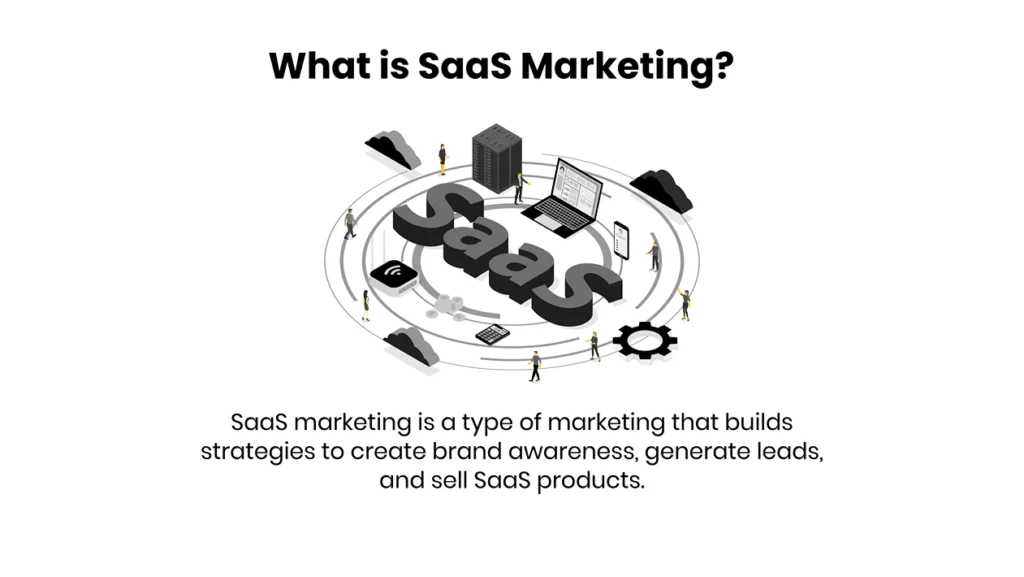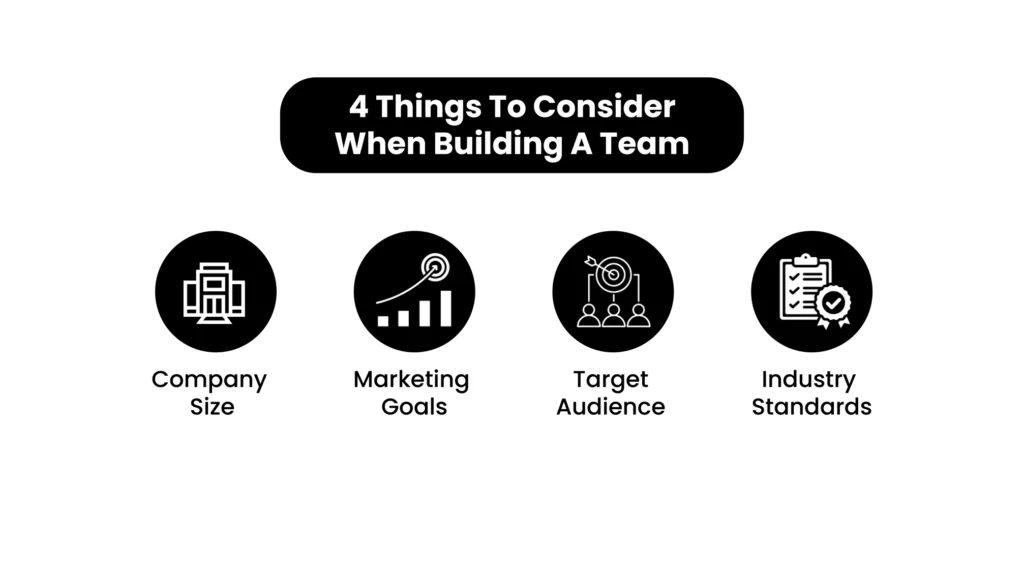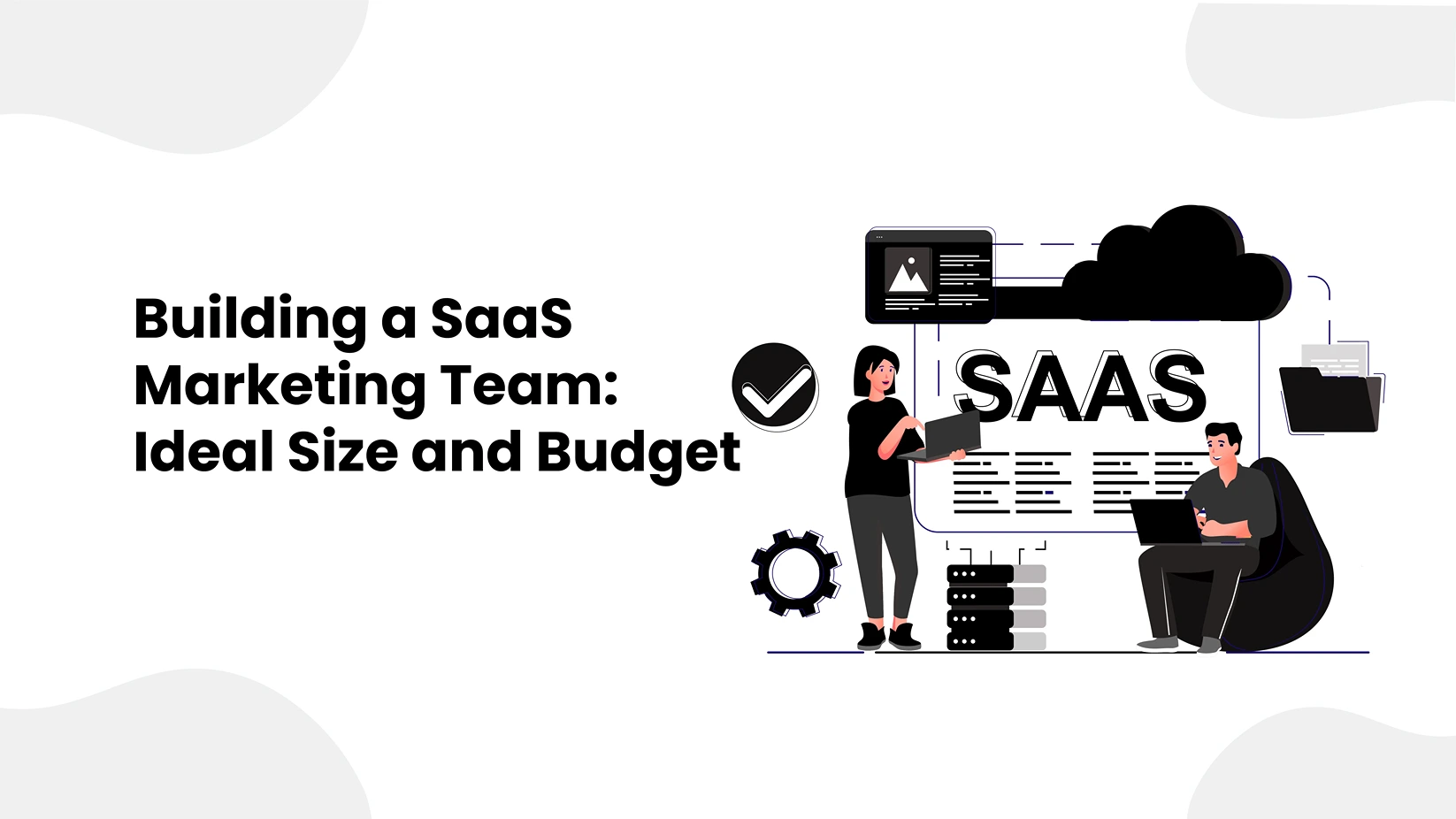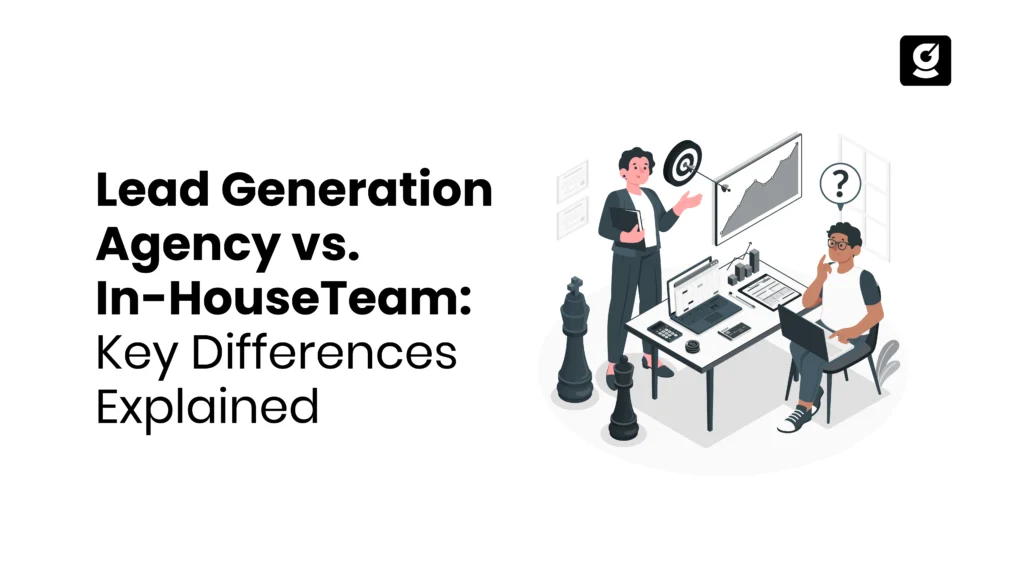The success of a software-as-a-service (SaaS) company depends on its marketing team.
A well-functioning marketing team can retain and attract customers, increase brand awareness, generate leads, and drive revenue growth.
However, building a SaaS marketing team is challenging. It requires careful planning, a clear understanding of the market, and a strategic approach. This guide will tell you how to build a high-performing SaaS marketing team and what size and budget to set.
Understanding SaaS Marketing
To create a high-performing SaaS marketing team, it’s essential to understand what SaaS marketing is.

Software as a Service (SaaS) marketing is how you build awareness and help sell software. Having a SaaS marketing team is crucial to growing your business. SaaS marketing helps bring products to market, position products, and build awareness about SaaS companies.
SaaS marketing aims to communicate the value proposition of subscription-based software, ultimately driving customer acquisition and loyalty. It involves creating and implementing strategies to attract potential customers. Then, you can convert them into paying subscribers and retain them over time.
This type of marketing also involves continuously analyzing data and metrics to improve campaign effectiveness and drive growth.
SaaS Marketing Roles and Skills
As you are planning to build a high-performing SaaS marketing team, it’s crucial to understand the various roles and skills that contribute to its success. Marketing is ever-evolving, and while some role names may shift, core responsibilities remain integral to marketing objectives.
As you build your SaaS marketing team, consider and tailor these roles to meet your organization’s unique needs and goals.
Growth Marketing
- Marketing Operations Manager
Responsible for streamlining marketing processes and optimizing efficiency.
- Paid Acquisition Manager or Specialist
Focuses on planning and executing paid advertising campaigns to drive user acquisition.
- Inbound Marketing Manager
Orchestrates strategies to attract and engage prospects through content and channels.
- Head of Demand Generation
Leads initiatives to generate demand for the product or service.
- Lifecycle/Email Specialist
Manages email campaigns and customer lifecycle communication.
- Account-based Marketing Specialist
Tailor’s marketing efforts to specific target accounts for a personalized approach.
- Search Engine Optimization (SEO) Specialist
Optimizes web content to improve search engine rankings and visibility.
Product Marketing
- Product Marketing Manager
Develop strategies to promote and position the product effectively in the market.
- Product Owner
Oversees the development and enhancement of the product, ensuring alignment with market needs.
- Sales Enablement
Equips the sales team with the tools and resources to close deals effectively.
- UX Writer
Crafts the user experience through compelling written communication.
- Service Marketing Manager
Focuses on marketing intangible services, ensuring a clear value proposition.
Content Marketing
- Content Marketing Manager
Oversees the content strategy, managing the end-to-end content creation process for cohesive marketing efforts.
- Copywriter
Crafts compelling copy for diverse marketing channels, tailoring messaging to target audience segments.
- Designer
Creates visually appealing assets, ensuring consistency to strengthen brand identity.
- Developer
Implements and optimizes conversion-focused landing pages, staying abreast of web technologies.
- Social Media Marketing Manager
Orchestrates social media strategies to increase brand awareness and engagement.
- PR Manager
Builds relationships with media and influencers, executing PR campaigns for enhanced brand visibility.
- Video Specialist
Creates and edits engaging video content for various marketing channels.
Common Mistakes When Building A SaaS Marketing Team
Building a successful team for a software-as-a-service (SaaS) company presents unique challenges, as does setting up a marketing team.
Here are some common mistakes companies make when building a SaaS team:
1. Not Setting Goals and Vision
Without clearly defined goals and a compelling vision, marketing teams lack the purpose of the company. This absence of goals and vision leads to unfocused efforts, inefficient resource allocation, and an inability to measure success effectively.
You have to establish specific and focused goals aligned with the business’s objectives. Also, regularly communicate the vision to your marketing team to keep them motivated.
2. Not Getting the Right Marketing Team Leader
The marketing team leader is the backbone of any marketing team. They can make the proper strategy planning, execution, and team confidence. A leader lacking strategic insight, experience, or leadership skills can result in a disorganized and demotivated team. That can also ultimately affect campaign outcomes and team productivity.
You must choose a leader with a proven track record, excellent communication skills, and an understanding of both traditional and modern marketing. The marketing leader should be capable of inspiring the team and driving them to the goals.
3. Not Hiring Marketing Channel Experts
Today’s marketing can be distributed on various channels such as digital, social media, email, and traditional media. Without experts who specialize in these individual channels, your agency will have problems. Companies need help to optimize their strategies and maximize each channel’s potential. Not having marketing channel experts can lead to poorly executed campaigns and a lower ROI.
You must identify key marketing channels for reaching your audience and hire or develop experts in these areas. A proper team and strategies will enhance the effectiveness of your strategy across different platforms.
4. Not Hiring the Right Marketing Agency
Hiring a marketing agency can provide an effective boost to a company’s marketing efforts. But remember, choosing the wrong SaaS marketing agency can be harmful to your business. A mismatch in expertise, misalignment of marketing styles, and communication barriers can lead to ineffective marketing strategies and wasted budgets.
When you are hiring an external marketing agency, carefully consider potential candidates. Look for agencies with experience in your industry and prioritize those that align with your company’s culture and values.
5. Not Having a Skilled Marketing Team
The overall skill level of the marketing team is necessary for the success of your business. A team lacking the required skills and up-to-date knowledge of current marketing trends and tools will find it challenging. This can result in underperforming marketing campaigns and a failure to engage effectively with target audiences.
You must invest time in continuous training and professional development for your marketing team. You can encourage them to learn new marketing technologies and stay updated with all the trends daily.
Factors to Consider When Determining Team Size
Your marketing team’s size depends significantly on your company’s size and growth stage.
Startups often begin with a team of generalists capable of wearing multiple hats. As your company grows, you can gradually expand your team, incorporating specific roles like content creators, SEO specialists, social media managers, and more.
The size of your marketing team can significantly impact your ability to achieve desired outcomes while staying within budget.
A team of 5-10 members is often optimal for a mid-sized SaaS company, balancing capabilities and costs. However, this can vary depending on your company’s unique needs and goals.
Here, we’ll explore the key factors to consider when determining the right team size for your SaaS company:

1. Company Size and Stage:
The size and stage of your SaaS company determine your marketing team’s size. Your company’s size dictates the scale and complexity of your marketing efforts.
- Startups: Startups typically start with teams focusing on essential marketing functions. As your business grows, you can expand your team.
- Mid-sized companies: Companies often have more extensive marketing needs, requiring a broader team with specialized roles to support their growth.
- Enterprise-level companies: Larger organizations with global presence may have sizable marketing teams to manage complex campaigns and initiatives.
2. Marketing Goals and Objectives:
Your marketing goals and objectives drive your team size. If your primary goal is rapid customer acquisition, you may need a larger team to execute various campaigns and strategies simultaneously. Conversely, your team may be more specialized and compact if you focus on customer retention and upselling to existing clients.
3. Target Audience and Market:
The nature of your target audience and market can also influence your team size. For instance, if your SaaS product caters to a niche market with a small customer base, you might not need an extensive team. Also, if your target audience is broad and diverse, a larger team may be required to reach and engage with different segments effectively.
4. Competition and Industry Standards:
Understanding the competitive landscape and industry standards in your niche is vital. If your competitors have sizable marketing teams, you may need to match or exceed their efforts to stay competitive. However, if your competitors are smaller or less active in marketing, you might have more flexibility in team size.
Budgeting for a SaaS Marketing Team
When you have the proper budget, you can build an efficient and effective marketing team.
According to a Gartner survey, the average marketing budget for SaaS companies is 11% of their total revenue. However, this can vary depending on industry, competition, and goals. It’s essential to consider your company’s needs and allocate budget accordingly carefully.
Regarding budgeting for a SaaS marketing team, there are several key areas to consider.
1. Marketing Software:
This is a crucial component of any SaaS marketing team. Budgeting for comprehensive marketing software ensures proper campaign management, customer relationship management, and automation of tasks. Researching and investing in the right software for your team’s specific needs is essential.
2. Content Creation:
High-quality content creation is the backbone of a successful marketing strategy. Allocating funds for content creation involves budgeting for writers, designers, video production, and other creative needs.
Also read : B2B SaaS Content Marketing Guide
3. Paid Advertising:
Whether it’s Google Ads, social media advertising, or sponsored content, paid advertising is typically a significant part of a SaaS marketing budget. Allocating a portion of the budget to paid advertising is crucial. It enhances brand awareness and attracts potential customers.
4. Employee Salaries:
This is often the most significant cost for SaaS companies, so it’s essential to budget for hiring and retaining talented professionals for your marketing team. Additionally, providing competitive salaries can attract top-tier talent.
5. Professional Development:
Investing in your team’s knowledge and skills can pay off in the long run, so budget for ongoing learning and development opportunities. This can include attending industry conferences, workshops, and online courses.
Always remember, the goal is to create a budget that allows for successfully implementing your marketing strategy while maintaining financial health and sustainability for your business. The budget for your marketing team should match your company’s growth stage and business goals.
Around 15-20% of revenue at a startup level could be directed towards marketing activities. Depending on your business’s performance, this percentage may decrease, but the overall budget may increase.
Check out this blog if you are seeking a good product marketing agency to market your product.
How can SaaS marketing agencies make your life better?
Partnering with a niche SaaS marketing company could be one of the most valuable investments in your SaaS business.
By specializing in specific markets, these revenue marketing companies can deliver targeted, effective marketing strategies that enhance recurring revenue and sustain growth. The great thing about SaaS is that it’s subscription-based, so you get consistent, recurring revenue.
A professional SaaS marketing company like growth.cx can help refine your value proposition. They offer a solution that resonates with your audience and encourages them to subscribe.
Sustainable growth in a SaaS business is also about customer retention, another area where a niche SaaS marketing company can deliver significant value. Their deep market knowledge can help you build long-term customer relationships, reduce churn, and increase lifetime value.
Hiring a niche SaaS marketing company can set you up for ongoing success in the competitive SaaS market. It is a step toward building a sustainable SaaS business.
Conclusion
While there is no one-size-fits-all answer to the ideal size and budget for a SaaS marketing team, these guidelines can serve as a starting point.
Building a growth team that aligns with your company’s goals and needs is essential. A well-structured and adequately funded SaaS marketing team can contribute significantly to your business’s success.
Keep your marketing strategy fresh by constantly evaluating and adapting. Remember these factors as you build and nurture your SaaS marketing team for long-term success.

FAQs
How does effective SaaS content marketing contribute to marketing team success?
The proper SaaS content marketing increases brand visibility, engages the target audience, and builds a solid foundation for successful product launches. Building brand authority and sustaining long-term growth depends on it.
How does SaaS SEO enhance product visibility and integrate into the marketing strategy?
By optimizing website structure and content, SaaS SEO boosts product visibility. It improves search engine rankings, making the product easier to find for the target audience. It ensures a comprehensive and impactful approach that aligns with marketing goals.



